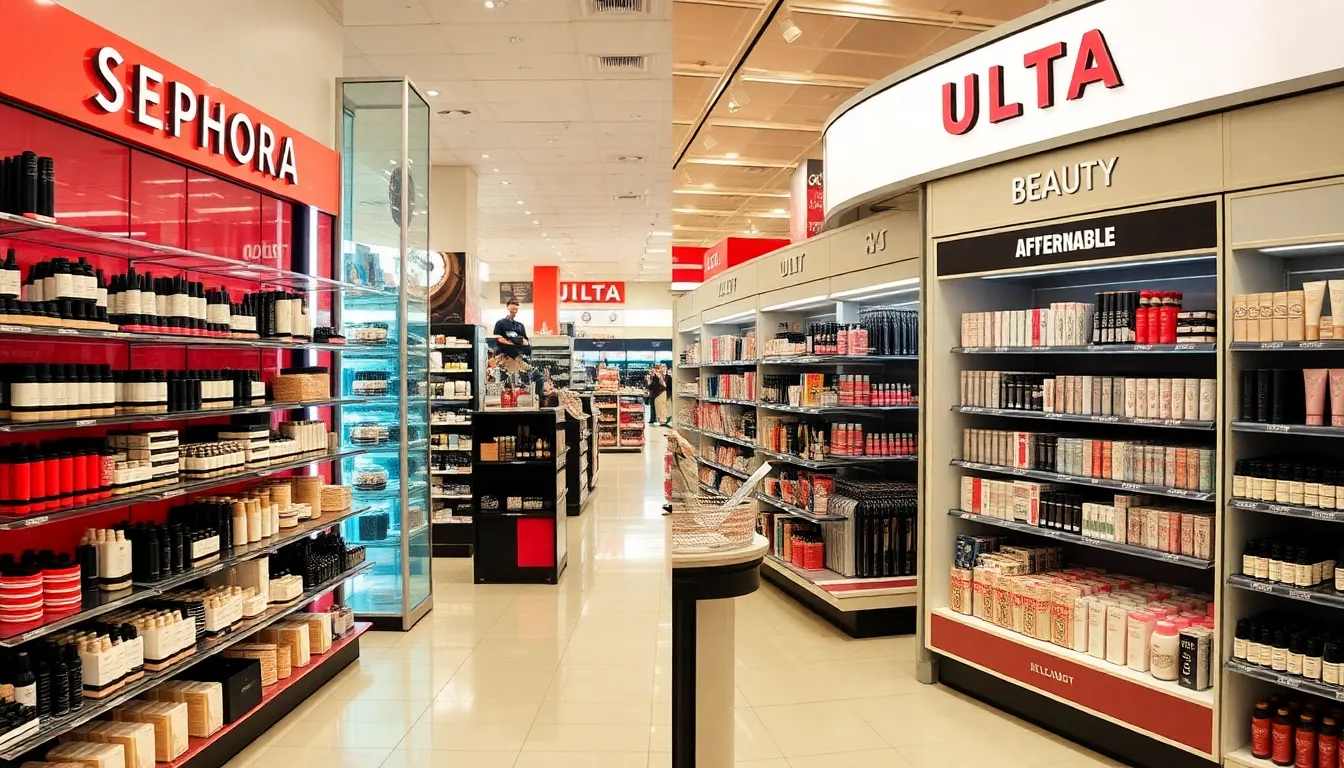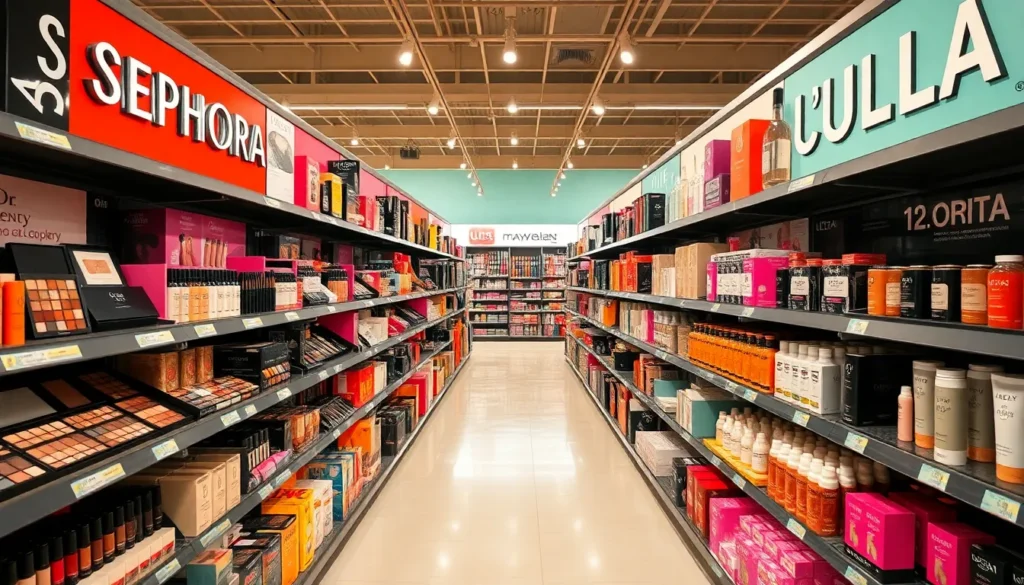When it comes to beauty shopping, two giants reign supreme: Sephora and Ulta. Both stores boast an impressive array of products, from high-end skincare to the latest makeup trends. But when it’s time to whip out the wallet, shoppers often find themselves wondering: which one truly offers the best bang for their buck?
Table of Contents
ToggleOverview of Sephora and Ulta
Sephora stands out for its luxury beauty products, featuring brands like Fenty Beauty and Dior. Ulta, on the other hand, combines high-end brands with drugstore options, offering products from brands like L’Oréal and Maybelline. Shoppers often appreciate this variety, allowing them to choose according to their budget.
Both retailers provide exclusive offerings. Sephora has unique rewards programs, while Ulta’s loyalty program emphasizes earning points on every purchase. Customers frequently compare these programs to see where they can gain more value over time.
Product selection varies between the two stores. Sephora focuses on a curated selection of established cosmetics brands, while Ulta emphasizes a wider range of beauty categories, including hair care and fragrances. They each cater to different preferences in shopping experiences.
Pricing strategies differ as well. Sephora typically represents higher-end brands with prices to match. In contrast, Ulta remains competitive through sales and promotions, making it a popular choice for budget-conscious shoppers.
Market presence plays a role in how each retailer operates. Sephora operates primarily in malls and standalone locations, while Ulta has a larger footprint that includes direct stores in suburban areas and enhanced e-commerce capabilities. Shoppers often evaluate convenience when deciding where to shop.
Ultimately, both Sephora and Ulta offer distinct advantages. Sephora attracts those seeking luxury, whereas Ulta offers diverse options and pricing strategies. Shoppers’ preferences ultimately influence their choice between these two beauty giants.
Pricing Structure Comparison

Pricing strategies between Sephora and Ulta reflect their targeted customer bases. Sephora offers premium products, often carrying higher price points due to exclusive brands like Dior and Fenty Beauty.
Sephora Pricing
Sephora tends to price its products on the higher end of the spectrum. For instance, many luxury foundations start around $40, while skincare items may exceed $100. Discounts and sales occur infrequently, with most products priced consistently. This approach emphasizes exclusivity, attracting consumers seeking high-end beauty products. The retailer’s rewards program provides some savings through points, but the initial price remains a barrier for budget-conscious shoppers.
Ulta Pricing
Ulta offers a more diverse pricing strategy, featuring both luxury and drugstore brands. Consumers find drugstore makeup and skincare starting at around $5. High-end brands also exist, with prices usually capping at $50. Frequent sales and promotions, including buy-one-get-one deals, enhance affordability. Customers can earn points on every purchase, making it easier to save over time. Overall, Ulta’s varied pricing attracts a wider audience, catering to both luxury seekers and budget shoppers.
Product Selection and Quality
Both Sephora and Ulta excel in product selection, showcasing various beauty items that appeal to diverse customer preferences.
Skincare Products
Sephora features luxury skincare lines, with brands like Drunk Elephant and Tatcha, targeting consumers who seek premium formulations. Prices for high-end serums can start at $50, reflecting the exclusivity of the offerings. Ulta, on the other hand, provides a balance of luxury and affordable skincare options, including brands such as Neutrogena and The Ordinary. Price points often begin at $7, catering to budget-conscious shoppers while maintaining quality. Both retailers highlight unique products, ensuring customers find solutions for multiple skin concerns.
Makeup Products
Sephora’s makeup selection leans heavily toward high-end brands, with renowned names like NARS and Too Faced that often command higher prices. Many foundations range from $30 to $60, appealing to those who prioritize prestige. Conversely, Ulta offers a wider variety, blending luxury items with popular drugstore makeup like Maybelline and e.l.f. Price ranges for Ulta’s offerings often begin at $5, making makeup accessible to a broader demographic. Customers can find exclusive collaborations at both retailers, enhancing their shopping experience.
Haircare Products
Sephora emphasizes salon-quality haircare brands, including Olaplex and Bumble and bumble, primarily attracting luxury seekers. Many high-end shampoos and conditioners are priced between $25 and $50. Comparatively, Ulta boasts a more extensive range of haircare products, featuring both luxury brands and budget-friendly options like Herbal Essences. Prices can start as low as $4, appealing to those wanting quality without breaking the bank. Both stores offer products tailored for different hair types, ensuring shoppers make informed choices.
Loyalty Programs and Discounts
Loyalty programs play a significant role in determining value at both Sephora and Ulta. Each retailer offers distinct incentives to attract and retain customers.
Sephora Rewards Program
Sephora operates a tiered rewards program called Beauty Insider. Members earn one point for every dollar spent, allowing redemption for exclusive products and experiences. In addition, shoppers gain access to birthday gifts and early sales. Members in higher tiers receive even more perks, such as free shipping and personalized product recommendations. With events like the Spring and Fall Bonus Sale, members can enjoy discounts on a wide range of products. Overall, the tiered structure encourages higher spending, making the program appealing for frequent shoppers.
Ulta Rewards Program
Ulta’s rewards system is known for its straightforward approach. Customers earn one point for every dollar spent, and every 100 points translates to a $3 discount. Members enjoy additional perks, including bonus points on specific promotions and birthday gifts. Frequent promotions, sales, and a points multiplier around events boost savings potential. Ulta also offers a Platinum status for members spending over $500 annually, enhancing access to exclusive offers. This structure promotes engagement and emphasizes value through tangible discounts, attracting budget-conscious shoppers.
Customer Experience
Customer experience plays a vital role in the shopping journey at Sephora and Ulta. Each retailer offers unique environments catering to different consumer preferences.
Store Atmosphere
Sephora creates an upscale ambiance, featuring sleek displays and well-lit areas that enhance product visibility. Customers find testers readily available, encouraging hands-on exploration of products. Attention to detail is evident, with knowledgeable staff always prepared to assist shoppers. In contrast, Ulta emphasizes a more casual and welcoming atmosphere, mixing high-end and drugstore products within the same space. Bright lighting and organized display units ensure shoppers can navigate easily. Both stores frequently host promotional events, drawing in customers eager to engage with brands.
Online Shopping
Online shopping experiences differ substantially between Sephora and Ulta. Sephora’s website offers an intuitive layout, enabling easy navigation of luxury brand selections and product categories. Customers appreciate features like virtual try-ons and detailed product descriptions. Ulta’s website combines beauty, health, and wellness in one platform, allowing shoppers to find everything they need in one place. Price comparisons are seamless, with frequent online promotions enhancing value. Each retailer leverages a mobile app to facilitate shopping on-the-go, ensuring ease of access to deals and loyalty points.
Choosing between Sephora and Ulta ultimately depends on individual preferences and budget. Sephora caters to those who prioritize luxury and high-end products while Ulta offers a blend of premium and affordable options.
For shoppers seeking variety Ulta’s extensive range across different beauty categories may provide better value. On the other hand those looking for exclusive luxury brands might find Sephora more appealing.
Both retailers have unique loyalty programs that can enhance the shopping experience. Ultimately it’s about aligning personal beauty needs with the right retailer to get the most value for money.







